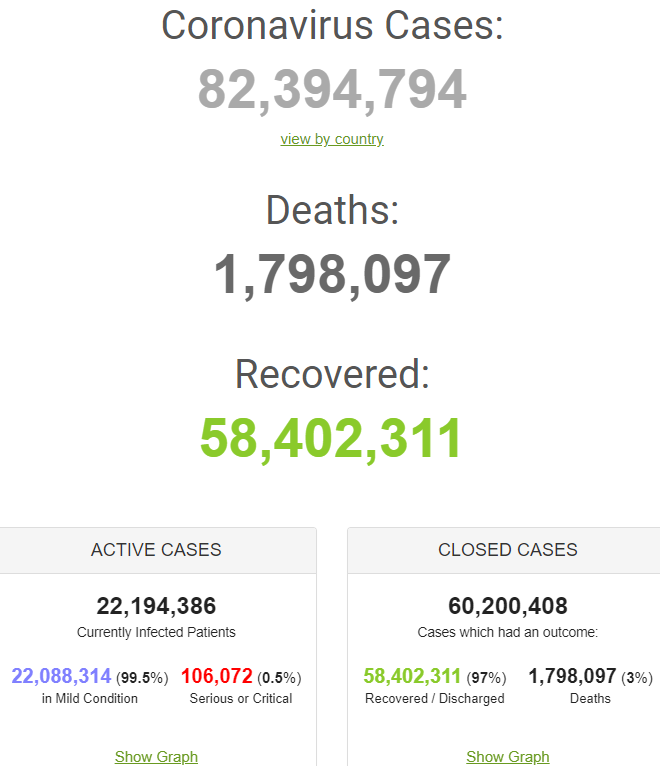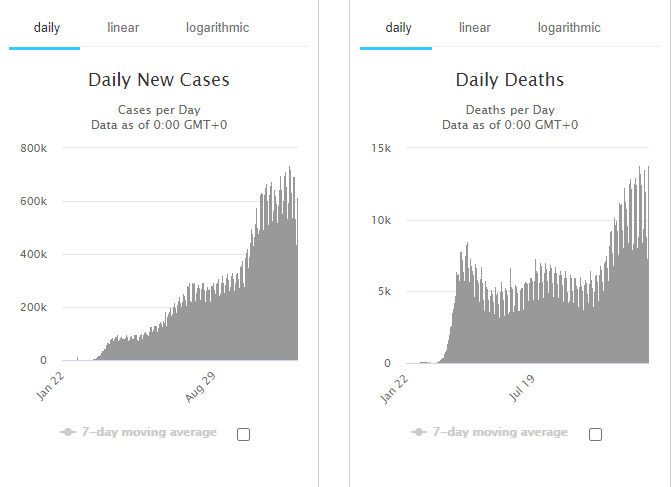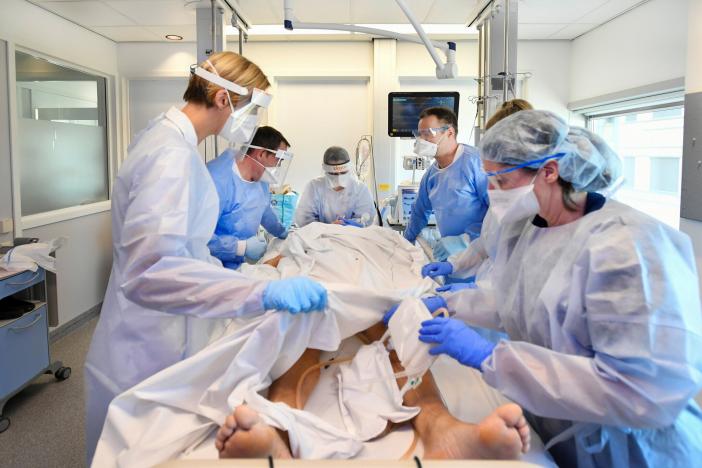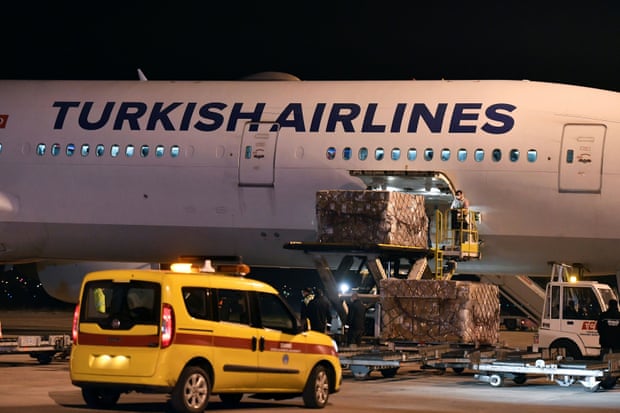
 i_need_contribute
i_need_contribute



|
Country, |
Total |
New |
Total |
|
World |
82,313,001 |
+615,394 |
1,795,676 |
|
19,977,704 |
+194,860 |
346,579 |
|
|
10,245,326 |
+20,529 |
148,475 |
|
|
7,564,117 |
+57,227 |
192,716 |
|
|
3,105,037 |
+27,002 |
55,827 |
|
|
2,574,041 |
+11,395 |
64,078 |
|
|
2,382,865 |
+53,135 |
71,567 |
|
|
2,178,580 |
+15,805 |
20,388 |
|
|
2,067,487 |
+11,212 |
73,029 |
|
|
1,906,057 |
+11,985 |
50,442 |
|
|
1,691,707 |
+19,062 |
32,420 |
|
|
1,614,822 |
+11,015 |
42,620 |
|
|
1,602,163 |
+11,650 |
43,018 |
|
|
1,389,430 |
+5,996 |
122,855 |
|
|
1,268,634 |
+7,914 |
27,454 |
|
|
1,212,481 |
+6,108 |
54,946 |
|
|
1,037,362 |
+6,988 |
18,081 |
|
|
1,021,451 |
+9,580 |
27,568 |
|
|
1,010,496 |
+1,588 |
37,574 |
|
|
777,902 |
+7,502 |
11,212 |
|
|
727,122 |
+7,903 |
21,703 |
|
|
685,293 |
+10,892 |
11,370 |
|
|
639,734 |
+857 |
19,234 |
|
|
623,066 |
+4,637 |
15,469 |
|
|
603,986 |
+1,958 |
16,488 |
|
|
593,541 |
+1,013 |
12,800 |
|
|
565,506 |
+10,299 |
15,378 |
|
|
511,261 |
+1,181 |
7,509 |
|
|
475,085 |
+1,776 |
9,992 |
|
|
471,526 |
+886 |
9,162 |
|
|
435,189 |
+2,160 |
7,314 |
|
|
412,398 |
+5,113 |
3,292 |
|
|
400,002 |
+3,336 |
6,751 |
|
|
362,488 |
+149 |
6,204 |
|
|
355,352 |
+1,868 |
6,059 |
|
|
331,755 |
+3,136 |
3,119 |
|
|
317,571 |
+902 |
9,292 |
|
|
291,393 |
+1,645 |
3,801 |
|
|
259,548 |
+708 |
1,840 |
|
|
238,279 |
+4,574 |
3,933 |
|
|
224,155 |
+2,012 |
2,443 |
|
|
223,120 |
+2,884 |
3,306 |
|
|
216,584 |
+1,101 |
2,575 |
|
|
210,326 |
+568 |
14,001 |
|
|
206,596 |
+1,350 |
3,795 |
|
|
204,369 |
+1,506 |
662 |
|
|
199,491 |
+1,438 |
7,405 |
|
|
190,404 |
+1,816 |
1,404 |
|
|
175,118 |
+2,298 |
1,430 |
|
|
170,187 |
+2,095 |
1,983 |
|
|
Dominican |
168,265 |
+860 |
2,405 |
|
166,799 |
+1,037 |
2,156 |
|
|
158,447 |
+2,621 |
1,226 |
|
|
158,296 |
+348 |
2,797 |
|
|
155,594 |
+751 |
9,106 |
|
|
153,199 |
+739 |
2,262 |
|
|
150,093 |
+236 |
932 |
|
|
143,428 |
+206 |
245 |
|
|
142,851 |
+927 |
2,934 |
|
|
136,976 |
+1,045 |
4,730 |
|
|
136,287 |
+846 |
4,781 |
|
|
135,459 |
+1,149 |
1,351 |
|
|
135,233 |
+1,333 |
7,520 |
|
|
134,802 |
+1,598 |
4,570 |
|
|
134,285 |
+1,921 |
1,347 |
|
|
128,633 |
+70 |
1,497 |
|
|
123,388 |
+243 |
1,913 |
|
|
123,153 |
+619 |
2,637 |
|
|
120,103 |
+390 |
3,088 |
|
|
117,305 |
+1,978 |
2,631 |
|
|
112,861 |
+225 |
1,021 |
|
|
108,615 |
+1,925 |
457 |
|
|
106,136 |
+762 |
2,220 |
|
|
99,350 |
+437 |
1,444 |
|
|
98,988 |
+357 |
2,745 |
|
|
96,139 |
+147 |
1,665 |
|
|
92,169 |
+234 |
351 |
|
|
88,439 |
+1,545 |
2,213 |
|
|
87,003 |
+27 |
4,634 |
|
|
85,560 |
+749 |
1,267 |
|
|
82,301 |
+497 |
2,473 |
|
|
80,654 |
+119 |
1,353 |
|
|
76,907 |
+75 |
613 |
|
|
58,725 |
+1,045 |
859 |
|
|
58,542 |
+13 |
29 |
|
|
57,146 |
+574 |
1,170 |
|
|
54,681 |
+178 |
335 |
|
|
48,278 |
+693 |
433 |
|
|
47,404 |
+435 |
677 |
|
|
46,088 |
+239 |
489 |
|
|
45,684 |
+269 |
1,313 |
|
|
6,098 |
+85 |
120 |
|
|
5,373 |
+50 |
49 |
|
|
1,454 |
+3 |
35 |
Retrieved from: https://www.worldometers.info/coronavirus/
From CNN's Mick Krever and Emma Reynolds
AstraZeneca has promised to supply hundreds of millions of doses of its Covid-19 vaccine to low and middle-income countries, and to deliver it on a not-for-profit basis to those nations in perpetuity.
The vaccine, developed at England's Oxford University, was approved for use by UK regulators on Wednesday -- the first country to do so.
It is significantly cheaper than other coronavirus vaccines and, crucially, it would be far easier to transport and distribute in developing countries than its rivals since it does not need to be stored at freezing temperatures.
"I think it's the only vaccine that can be used in those settings at the current time," Azra Ghani, chair in infectious disease epidemiology at Imperial College London, told CNN.
The Oxford/AstraZeneca vaccine can be kept at refrigerator temperatures of 2 to 8 degrees Celsius (36 to 46 degrees Fahrenheit) for at least six months. Moderna's vaccine has to be stored at minus 20 degrees Celsius (minus 4 degrees Fahrenheit) -- or at refrigerator temperatures for up to 30 days -- and the Pfizer/BioNTech vaccine has to be stored at minus 75 degrees Celsius (minus 103 degrees Fahrenheit), and used within five days once refrigerated at higher temperatures.
"Pfizer and Moderna require freezer storage, and that just isn't in place in many settings," Ghani said.
"Cold chain" refrigeration is the standard storage used globally to deliver vaccines from central locations to local health clinics. AstraZeneca's vaccine is so far "the only one that can definitely be delivered to those systems," Ghani added.
The vaccines are based on different technology. AstraZeneca's offering -- like Johnson & Johnson's vaccine and Russia's Sputnik V -- uses an adenovirus to carry genetic fragments of coronavirus into the body.
From CNN's Ben Westcott in Melbourne, Australia

In this still image taken from a social media video, people wearing Santa hats gather at Bronte Beach, in Sydney, Australia, amid the coronavirus outbreak on December 25. @stucrabb/Instagram/Reuters
Australia's Minister of Immigration, Citizenship and Multicultural Affairs has threatened to cancel the visas of any visitors caught breaking rules designed to prevent the spread of Covid-19 in the country, after hundreds of people attended a beach party in Sydney's Bronte Beach on Christmas Day.
Only 100 people were allowed to gather at an outdoor event in Greater Sydney on December 25 after a new outbreak of Covid-19 in the city's Northern Beaches region led to tightened restrictions over the Christmas period.
But witnesses said the crowd at Bronte Beach on the afternoon of Christmas Day was in its "hundreds," many of whom were drinking alcohol and not wearing face masks. Brad Hazzard, Health Minister for the state of New South Wales (NSW), warned the party could be a "superspreader event."
Local journalist Peter Hannam, who walked by the event at 5 p.m., said a number of people in attendance were talking loudly in British accents.
"These are the same people who would every summer gather at Bondi Beach or Bronte or somewhere else because they want to show off to their northern hemisphere friends that it's Christmas and we're in summer," he said.
It's not immediately clear how many of the crowd were residents or visitors on temporary visas. Australia's borders have been closed to anyone except citizens and residents since March, but the government announced in April that temporary visa holders -- including backpackers -- could extend their visas.
But now, Immigration Minister Alex Hawke has warned that any foreign citizens caught breaching public health orders could have their visas reviewed or even canceled.
"Visitors to Australia need to be very clear that if they breach public health orders they are threatening the health and safety of Australians and the federal government will look at their visas," he said in an interview with the Australian Broadcasting Corporation on December 29.
From CNN's Kate Sullivan and Arlette Saenz

US President-elect Joe Biden said Tuesday that the Trump administration's plan to distribute Covid-19 vaccines across the country has fallen "far behind."
"As I long feared and warned, the effort to distribute and administer the vaccine is not progressing as it should," Biden said, delivering remarks on the Covid-19 crisis from Wilmington, Delaware.
"A few weeks ago, the Trump administration suggested that 20 million Americans could be vaccinated by the end of December. With only a few days left in December, we've only vaccinated a few million so far," he added.
Biden said if the vaccination program continues at the current pace "it's going to take years, not months, to vaccinate the American people." The President-elect had received a briefing from his Covid-19 advisory team earlier Tuesday, a transition official told CNN.
On December 9, Health and Human Services Secretary Alex Azar said on CNN's "New Day" that "20 million people should get vaccinated in just the next several weeks."
About 11.4 million doses of Covid-19 vaccines have been distributed in the US and about 2.1 million have been administered as of Tuesday evening, according to the US Centers for Disease Control and Prevention.
The President-elect has laid out a plan to distribute 100 million vaccine shots, which is enough to cover 50 million people, in his initial 100 days in office. He reiterated on Tuesday that Congress would need to provide the necessary funding in order to reach that goal.
Retrieved from: https://edition.cnn.com/world/live-news/coronavirus-pandemic-vaccine-updates-12-30-20/index.html
Over the weekend, Bulgaria received its first shipment of 9,750 doses of the coronavirus vaccine. Before the vaccination rollout on Sunday, Bulgarian authorities turned to hot dog trucks to deliver the vaccine to different locations across the country.
Escorted by the police, several refrigerated vans initially delivered the doses to at least a couple of cities. The Pfizer-BioNTech vaccine must be stored at extreme temperatures of minus 70 degrees Celsius to remain effective, and it can be kept at temperatures of 2 degrees to 8 degrees Celsius for up to only five days.
News about the unorthodox choice of transportation prompted a wave of mockery on social media.
Hot dog-themed memes, bearing the logo of Pfizer, with Photoshopped images and frankfurter-related puns and jokes, have flooded Facebook and Twitter. One Facebook post included a picture of frankfurters stamped with the Pfizer logo.And an old, popular ad for this particular hot dog brand — showing a shopkeeper in a butcher’s store holding a string of hot dogs — was being shared online, but, this time, with an updated tagline: “The vaccines are here.”
The vaccination campaign begins at a time when Bulgaria has one of the highest Covid-19 death rates in the E.U., with more than 25 people per 100,000 dying from the virus over 14 days, according to the European Center for Disease Prevention and Control, and its health system has been struggling to cope with the surge of virus patients.
While some Bulgarians have mocked the creative mode of transportation, others have expressed concern that it signals that the state is not well prepared to receive and store the first batch of the vaccines.
“It doesn’t matter if the trucks have images of hot dogs or Black Angus beef plastered on them,” Mariya Sharkova, a lawyer specializing in health care, said. “What matters is for the government to strictly follow the distribution and storage regulations.”
She is concerned that the delivery of vaccines in food trucks may make the country legally liable, she said, since “the vaccine manufacturer cannot be held responsible” if “transport and distribution protocols are not observed properly.”
“Bulgarian authorities knew, for a while now, exactly when the first vaccines were arriving,” said Desislava Nikolova, a health editor at the Bulgarian newspaper Capital Weekly. “It perplexes me why the government needed to use a hot dog truck instead of a vehicle licensed for distribution of thermolabile medicines.” Bulgaria has strict laws about the proper transportation of pharmaceuticals, and each vehicle needs to be licensed and registered with health authorities.
Kostadin Angelov, the health minister, assured Bulgarians that the hot dog trucks had met all of the requirements needed for storage of the vaccine, and said that he found the hot dog-inspired jokes “inappropriate.”
“Seeking to exploit that aspect is unacceptable,” he told reporters on Sunday shortly after becoming the first Bulgarian to be inoculated. “Bulgaria is not the only country where private logistics companies provide transportation.”
Mr. Angelov vowed that this first batch was an exception and the next deliveries of the vaccine would be distributed using transportation provided by the manufacturer.
Ms. Sharkova worries that the delivery incident might further worsen vaccine skepticism among some Bulgarians.
“There are many people outside of the anti-vax movement who are hesitant to get vaccinated,” she said. “Instead of using the vaccine arrival to defuse their fears, the state has become a target of ridicule.”

Medical staff treating a patient with Covid-19 in the intensive care unit at Maastricht University Medical Center+ in Maastricht, Netherlands, last month.Credit...Piroschka Van De Wouw/Reuters
The pandemic has caused the highest number of excess deaths in the Netherlands since World War II, the CBS, the country’s independent national statistics bureau, said on Tuesday.
Up to last week, the Netherlands — which has a population of roughly 17 million people — reported 162,000 deaths, about 13,000 more than usual, according to the CBS, the statistics bureau, whose figures are used by the government and businesses in the Netherlands. During both waves of the virus, when European countries struggled to contain cases, the number of excess deaths in the country was notable. All excess deaths during the first wave in the spring were caused by the coronavirus, according to the statistics bureau, and an August heat wave also caused some excess deaths this year.
Over the summer, the country had barely any lockdown measures in place, and some people were able to go on vacation. But over the past few months, as the country has been facing and trying to fight a brutal second wave of the pandemic, 6,100 more people died than would have been expected. The Netherlands has also found cases of the British variant in the past week.
The pandemic has hit the Netherlands particularly hard. Earlier this month, Prime Minister Mark Rutte announced harsh new lockdown measures — the strictest of the pandemic — until at least Jan. 19 because of “a dramatic increase in the number of infections, with figures up to around 9,000 per day,” according to the government.

Workers unload a shipment containing boxes of China’s Sinovac coronavirus vaccine at Esenboga Airport in Ankara, Turkey, on 30 December, 2020. Photograph: Reuters
Turkey received its first shipment of Covid-19 vaccines from China’s Sinovac early on Wednesday, Reuters reports, almost a week after Ankara said the vaccine was safe and effective, based on interim Phase III trial results.
The shipment of 3 million doses, part of a deal for a total of 50 million, was initially set to arrive on 11 December but faced setbacks.
On Twitter, health minister Fahrettin Koca said authorities would begin inoculations after testing the vaccines, a process that will take 14 days.
Turkey has reported more than 2.1 million Covid-19 cases since March, while more than 20,000 people have died.A recent surge in new cases, which placed the country among those with the highest number of daily cases for several weeks, led the government to impose weekend lockdowns and weekday curfews.
Daily cases have since come down to around 15,000.
Ankara plans first doses for health workers and those older than 65, the ministry has said, followed by those older than 50 and suffering at least one chronic illness, in addition to those in specific sectors or high-risk environments.
The third group will include young adults and sectors not included in prior groups. A fourth group covers all the rest not listed.
Last week, Turkish researchers said interim analysis showed the vaccine was 91.25% effective, although, at the time, Koca said authorities were certain the vaccine was effective and safe, the trial data, based on 29 infections, was seen as too limited for final approvals.
Sinovac is seeking to consolidate data from global trials in countries such as Brazil, Chile, Indonesia and Turkey.
Retrieved from: https://www.theguardian.com/world/live/2020/dec/30/coronavirus-live-news-uk-approves-oxford-astrazeneca-vaccine-updates
Denmark has extended a hard lockdown for two weeks, until 17 January, to limit the spread of Covid-19, following a drastic spike in new infections over the past month, the country’s prime minister said on Tuesday.
The situation regarding infection rates, hospitalisations and deaths is now even more serious than in the spring,” Mette Frederiksen told a press briefing.
The extension of the current country-wide restrictions announced on December 16 will keep schools, shopping malls, restaurants, bars and other non-essential shops closed, Frederiksen said.
The Nordic country had fared relatively well through the pandemic until December, when the number of new infections more than doubled compared with the previous month. “The scenario we feared in the spring may become a reality in the coming weeks and months if we don’t act now,” Frederiksen said. Denmark on Tuesday reported 2,621 new cases among its population of 5.8 million over the past 24 hours, while the number of new hospitalisations rose by 28 to a record 900, close to the maximum capacity of its Covid-19 wards.
Here are the key developments – and UK flight bans – from the last few hours:
· Brazil recorded 58,718 additional confirmed cases of coronavirus in the past 24 hours, along with 1,111 deaths, the Health Ministry said. It is the worst daily death toll reported by the ministry since September 15th.
· Jared Polis, the governor of Colorado, has announced the first case in the US of the COVID-19 variant B.1.1.7, the same more transmissible strain discovered in the UK earlier this month.
· The Canadian province of Quebec has urged the federal government to require COVID-19 testing for residents returning from year-end vacations, after images of maskless tourists frolicking on overseas beaches hit social media as cases rise.
· Denmark has extended a hard lockdown for two weeks, until 17 January, to limit the spread of Covid-19, following a drastic spike in new infections over the past month, the country’s prime minister said on Tuesday.
· The UK has recorded 53,135 new daily infections, health data showed on Tuesday, as well as 414 deaths.
· The French heath ministry reported 11,395 new coronavirus infections over the past 24 hours on Tuesday, jumping above the 10,000 threshold for the first time in four days. The French health minister, Olivier Véran, said the government could soon impose an earlier curfew that would start at 6pm instead of 8pm in eastern areas due to the spread of the coronavirus.
· Ireland reported the highest Covid-19 cases in a single day on Tuesday with 1,546 infections, up from a previous record of 1,296 on Saturday.
· The Algerian president, Abdelmadjid Tebboune, has returned home after being treated for Covid-19 in Germany, state television reported on Tuesday.
· Germany could offer shots against the coronavirus to all who want them by the summer if a third vaccine from either Johnson & Johnson, AstraZeneca or CureVac wins EU approval, the country’s health minister, Jens Spahn, said.
· Chile said on Tuesday it had recorded its first case of the British variant of coronavirus, prompting health authorities to reinstate a mandatory quarantine period for all visitors entering the South American nation from abroad.
· Argentina began to vaccinate its citizens against the coronavirus on Tuesday using 300,000 doses of the Russian Sputnik V treatment delivered last week, the government said.
· More areas of England could be placed under tougher coronavirus restrictions when the health secretary outlines changes to tiers on Wednesday. Matt Hancock will address the recalled House of Commons after MPs have passed key legislation on the post-Brexit trade deal with the European Union.
· The United Arab Emirates has discovered a “limited number” of cases of people infected with the new coronavirus variant in the country, a government official has said.
Retrieved from: https://www.theguardian.com/world/live/2020/dec/29/coronavirus-live-news-more-countries-alert-suspected-cases-new-uk-covid-variant